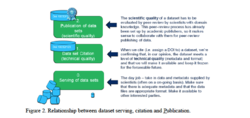Difference between revisions of "Computational Result Review Process"
| (7 intermediate revisions by the same user not shown) | |||
| Line 1: | Line 1: | ||
| − | We define | + | We define various states through which large scale computational results are migrated. Each stage indicates and increasing level of confidence in the correctness of the results. |
| + | |||
| + | |||
== Define Data Set == | == Define Data Set == | ||
| − | + | To begin, we define the data set under consideration. For example, a hazard curve that is part of a study, might be considered, even if the full study is not complete. A single hazard curve could be in one state, while full study can be in another state. | |
| + | |||
| + | == State 1 - Started == | ||
| + | Data set calculations have begun. | ||
| − | == Preliminary == | + | == State 2 - Preliminary == |
| − | + | The data set calculations are completed, and complete results are believed to exist. | |
| − | == Reviewed == | + | == State 3 - Reviewed == |
| − | Data-set specific, standardized, defined, checks ready for use internal researchers. For example, for a hazard curve, review checks might include: | + | Data-set specific, standardized, defined, checks ready for use internal researchers. |
| − | * | + | |
| + | For example, for a hazard curve, review checks might include: | ||
| + | * No Nan | ||
| + | * No zero entries (for data sets where non-zero entries are not defined) | ||
* No amplitudes beyond 5g | * No amplitudes beyond 5g | ||
| − | * | + | * All rupture variations have amplitudes for all components |
| − | |||
| − | + | When we consider the full study as the data set under consideration, we might define the following rules: | |
| − | * all hazard curves reviewed state, plus | + | * all component hazard curves are in the reviewed state, plus |
| − | * new hazard maps | + | * Calculate new hazard maps |
| − | * ratio maps between new results and 14.2 | + | * Calculate ratio maps between new results and 14.2 |
| − | == Publishable == | + | == State 4 - Publishable == |
Ready for use by external researchers. | Ready for use by external researchers. | ||
| + | |||
| + | == NERC Mode == | ||
| + | |||
| + | * Dataset Serving | ||
| + | * Dataset of Technical Quality | ||
| + | * Dataset of Publication Quality | ||
| + | |||
| + | [[Image:Stages of Publication.png|right|250px]] | ||
== Related Entries == | == Related Entries == | ||
*[[CME Project]] | *[[CME Project]] | ||
*[[CyberShake Project]] | *[[CyberShake Project]] | ||
| + | *[[CyberShake Review Process]] | ||
Latest revision as of 21:49, 4 September 2015
We define various states through which large scale computational results are migrated. Each stage indicates and increasing level of confidence in the correctness of the results.
Contents
Define Data Set
To begin, we define the data set under consideration. For example, a hazard curve that is part of a study, might be considered, even if the full study is not complete. A single hazard curve could be in one state, while full study can be in another state.
State 1 - Started
Data set calculations have begun.
State 2 - Preliminary
The data set calculations are completed, and complete results are believed to exist.
State 3 - Reviewed
Data-set specific, standardized, defined, checks ready for use internal researchers.
For example, for a hazard curve, review checks might include:
- No Nan
- No zero entries (for data sets where non-zero entries are not defined)
- No amplitudes beyond 5g
- All rupture variations have amplitudes for all components
When we consider the full study as the data set under consideration, we might define the following rules:
- all component hazard curves are in the reviewed state, plus
- Calculate new hazard maps
- Calculate ratio maps between new results and 14.2
State 4 - Publishable
Ready for use by external researchers.
NERC Mode
- Dataset Serving
- Dataset of Technical Quality
- Dataset of Publication Quality
